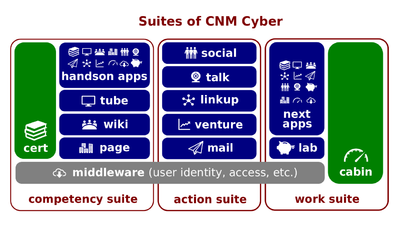Developments at the Wiki
Developments at the Wiki (hereinafter, the Lectio) is the lesson part of Wiki Editing Essentials lesson that introduces its participants to wiki edit concepts. This lesson belongs to the CNMCT Entrance section of the CNMCyber Bootcamp.
Content
The predecessor lectio is What Wiki Categories Are.
Script
- CNM Wiki is a development hub. Here, CNMCyber Team develops requirements for future CNMCyber services and CNM apps. The software and some other deliverables are further developed at another hub called CNM Lab.
- Two categories of wikipages are used in the development of requirements.
- First, those pages that belong to the Category:Product Epics are utilized to express product epics. Secondly, those pages that belong to the Category:Sprint Backlogs are utilized to express the results of Sprint Zeros.
- Any development starts with a vision of what needs to be developed. Before CNMCyber was developed, somebody imagined what CNMCyber could be, what it could do, and who would use it. The content that describes a future work product, its part, function, or feature is called product epic.
- The Category:Software Epics is reserved to develop requirements for CNM apps such as CNM MediaWiki, while the Category:Service Epics is reserved for requirements for CNM Cyber services such as CNM Wiki. Both categories are subcategories of the Category:Product Epics.
- If two or more people are working on the same product, a bigger product epic may further be divided in smaller requirements such as user stories. Ideally, one story presents a feature that can be developed in one Sprint; however, some stories can take much longer time to become a feature. The stories and their drafts are published on those Talk pages that are attached to the Category:Product Epics.
- At CNM Wiki, a Talk page is any wikipage that is attached to a content page. Talk pages can be used for discussions related to the "content page" matters; Talk pages can be accessed via the "Discussion" tab in the page type menu.
- Besides requirements, the Talk pages of CNM Wiki may be used to publish any notes about the content pages and any content drafts.
- Collectively, those user stories that are developed for one work product are called a product backlog. One user story that is included in the backlog is called product backlog item or PBI.
- Most of developments occur organically, without any planning. If a development has a schedule and/or budget constraints, the Team hires dedicated developers such as Careerprise contractors and chunks this development in sprints. The planning phase is called Sprint Zero.
- During the Sprint Zero, a product owner that represents the Team and representatives of the developers together select and prioritize those PBIs that would be worked on during the development. The goal of Sprint Zero is to decide what would be developed, in what sequence, when and where this would be developed, how the communications between the Team and developers occur, how the Team accepts the results, and how the possible conflicts would be resolved.
- Those PBIs that are selected become sprint backlog items or SBIs. All together, they are called sprint backlog and published on the wikipages that belong to the Category:Sprint Backlogs. The attached Talk pages are utilized for development iterations or sprints.
- The framework that CNMCyber Team follows in its development is called CNM Agile.
Key terms
- Talk page, Category:Product Epics, Category:Software Epics, Category:Service Epics, product backlog, product backlog item (PBI), sprint backlog, sprint backlog item (SBI), Category:Sprint Backlogs
Closing
- Which of the statements below is incorrect:
- CNMCyber Team follows CNM Agile framework.
- Product epics can be divided into user stories.
- The prioritized PBIs become SBIs.
- At CNM Wiki, Talk pages can be used to publish notes about the content page
- None of the answers is incorrect.
The successor lectio is Surroundings of Projects.
